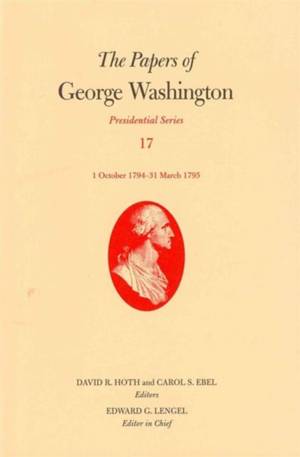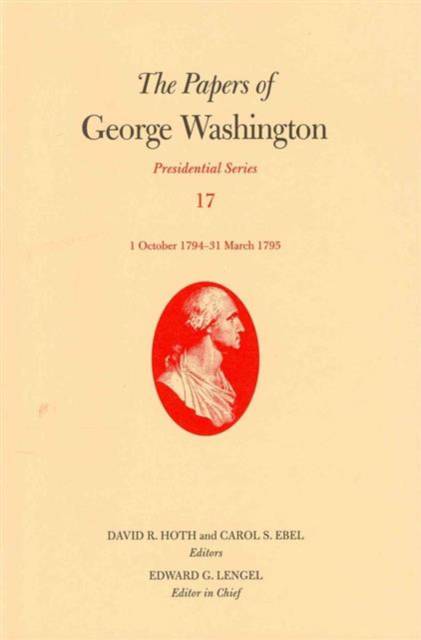
- Afhalen na 1 uur in een winkel met voorraad
- Gratis thuislevering in België vanaf € 30
- Ruim aanbod met 7 miljoen producten
- Afhalen na 1 uur in een winkel met voorraad
- Gratis thuislevering in België vanaf € 30
- Ruim aanbod met 7 miljoen producten
Omschrijving
The highlight events of the months from October 1794 through March 1795, the period documented by volume 17 of the Presidential Series, were the suppression of the Whiskey Insurrection in western Pennsylvania and the negotiation of the Jay Treaty with Great Britain.
The volume opens with Washington, believing that his constitutional duty as commander in chief required his presence, en route to rendezvous with the troops called out to suppress the insurrection. After meeting with representatives from the insurgent counties and reviewing the troops, he concluded that serious resistance was unlikely, and, after penning a letter to Henry Lee on 20 October commending the troops and reminding them to support the laws, he returned to the capital. Still, regular letters from Alexander Hamilton, who remained with the expedition, kept him apprised of troop movements and activities. Washington devoted more than half of his annual address to discussion of the rebellion. After the submission of the rebellious counties, he also had to consider requests for pardons for the few individuals not included in a general pardon issued in November.
Other domestic issues included a transition in Washington's cabinet, as Hamilton and Henry Knox resigned the Treasury and War departments; supervision of the Federal City, where the commissioners sent a comprehensive statement of the affairs of the City to Washington in early 1795; and Indian affairs, which in the north involved the aftermath of the Battle of Fallen Timbers and treaty negotiations with the Iroquois and Oneida, and in the south involved news of the destruction of the Cherokee towns of Nickajack and Running Water as well as continuing concerns about Creek hostility in Georgia and the Southwest Territory. Washington also received an early report that the Yazoo land scheme threatened to increase tensions with the Creeks in Georgia.
In addition to writing the State Department, John Jay kept Washington apprised of the progress of negotiations. Of particular note are his letters of 19 November, announcing the signing of the treaty, and 25 February, justifying his efforts. However, although notice of the treaty was received, the official copy did not arrive at Philadelphia by the adjournment of Congress, so consideration of the treaty would await a special session of the Senate. Meanwhile, Samuel Bayard had been dispatched to London to prosecute American claims in the British admiralty courts.
Elsewhere, Thomas Pinckney was sent to Madrid as a special envoy to revive stalled negotiations with Spain. David Humphreys returned to the United States to discuss negotiations with the Barbary States, prompting Washington to ask Congress to authorize consuls for those states and to appoint Humphreys as minister plenipotentiary to negotiate with them. James Monroe sent one optimistic letter discussing his reception as minister to France.
As for private concerns, Washington's weekly correspondence with his Mount Vernon farm manager, largely suspended during his time with the troops, resumed upon his return to Philadelphia. He entertained offers about his lands in western Pennsylvania, on the Ohio River, and on Difficult Run in Virginia, and he paid taxes on and sought information about his land in Kentucky. Washington also corresponded with Tobias Lear about the Potomac Company's development of the Potomac River.
The correspondence volumes of The Papers of George Washington, 1748-99, published in five series, include not only Washington's own letters and other papers but also all letters written to him. The ten-volume Colonial Series (1748-75) focuses on Washington's military service during the French and Indian War and his political and business activities before the Revolution. The massive Revolutionary War Series (1775-83) presents in documents and annotations the myriad military and political matters with which Washington dealt during the long war. The papers for his years at Mount Vernon after leaving the army and before becoming president have been published in the six-volume Confederation Series (1784-88). The remaining years of Washington's life are covered in the Presidential Series (1788-97), which includes the papers of his two presidential administrations, and the four-volume Retirement Series (1797-99), which includes his correspondence after his final return to Mount Vernon.
Specificaties
Betrokkenen
- Auteur(s):
- Uitgeverij:
Inhoud
- Aantal bladzijden:
- 800
- Taal:
- Engels
- Reeks:
Eigenschappen
- Productcode (EAN):
- 9780813934167
- Verschijningsdatum:
- 24/09/2013
- Uitvoering:
- Hardcover
- Formaat:
- Genaaid
- Afmetingen:
- 168 mm x 241 mm
- Gewicht:
- 1247 g

Alleen bij Standaard Boekhandel
Beoordelingen
We publiceren alleen reviews die voldoen aan de voorwaarden voor reviews. Bekijk onze voorwaarden voor reviews.











